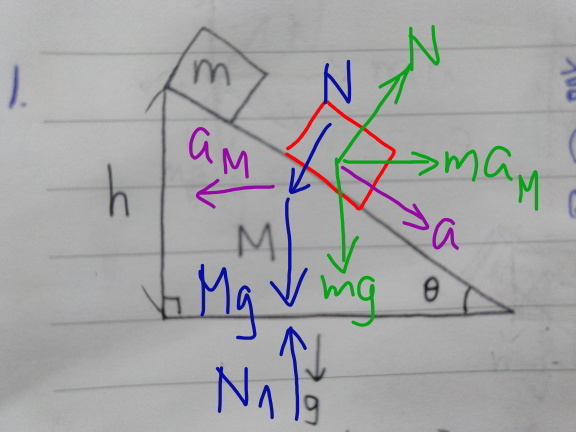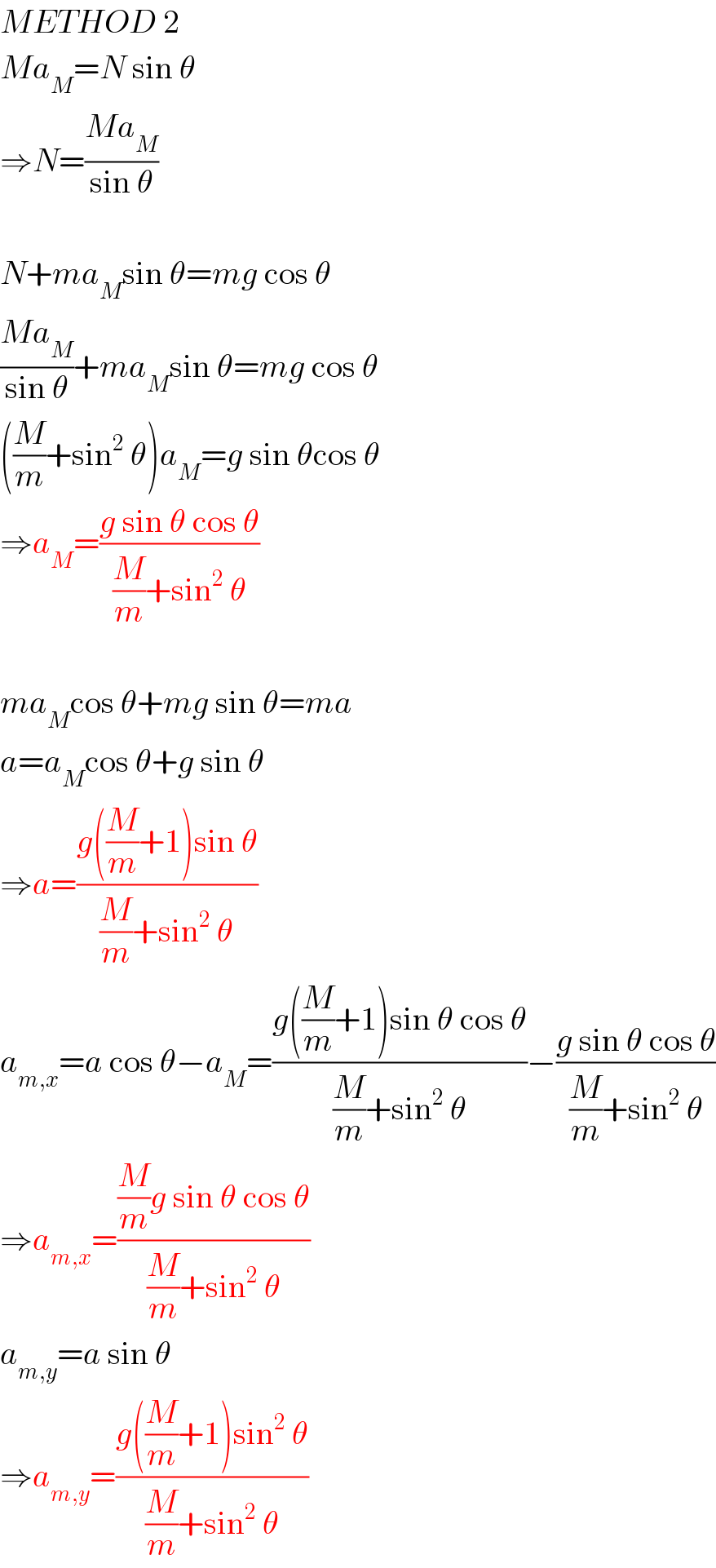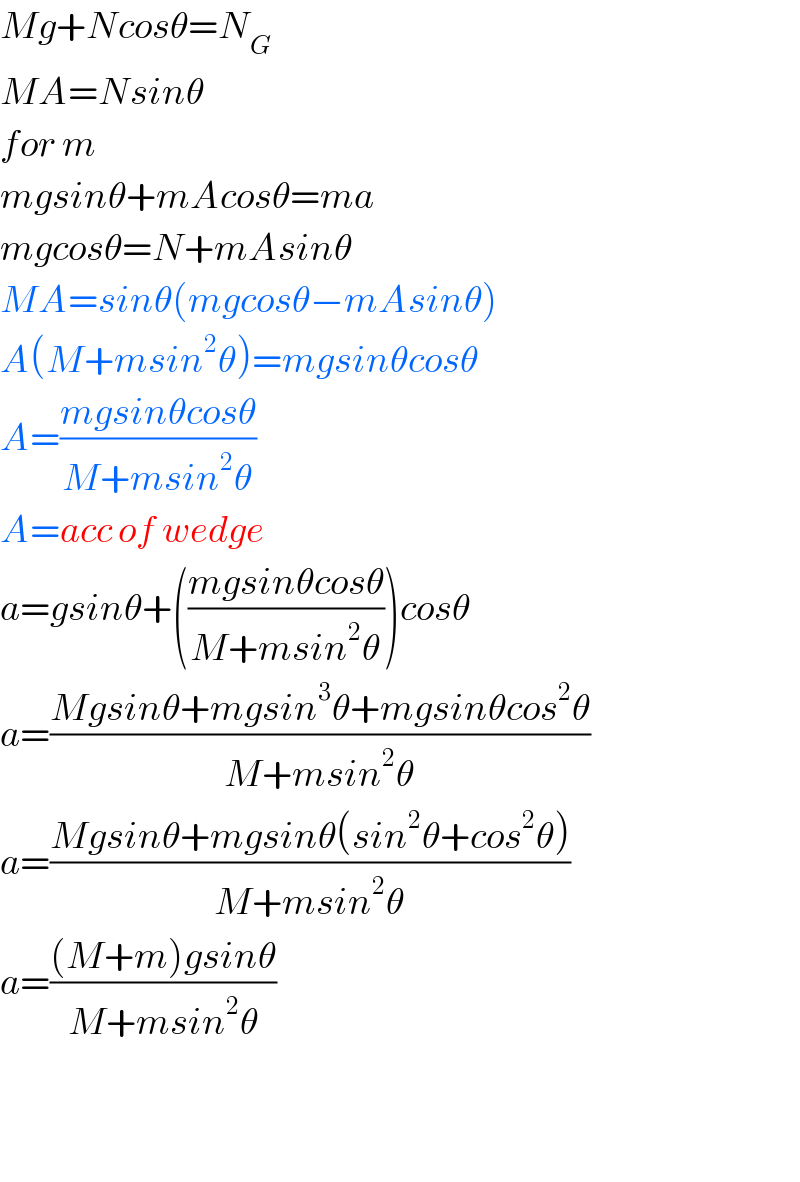
Question Number 68342 by Tony Lin last updated on 09/Sep/19

Commented by Tony Lin last updated on 09/Sep/19

$${when}\:{m}\:{slide}\:{to}\:{the}\:{bottom} \\ $$$${if}\:{there}\:{is}\:{no}\:{fraction} \\ $$$${find}\:{v}_{{m}} \&{v}_{{M}} \\ $$$${find}\:{a}_{{m}} \&{a}_{{M}} \\ $$
Answered by mr W last updated on 09/Sep/19

Commented by mr W last updated on 10/Sep/19

$${METHOD}\:\mathrm{1} \\ $$$${position}\:{of}\:{block}\:{M}:\:{x} \\ $$$${a}_{{M}} =\frac{{d}^{\mathrm{2}} {x}}{{dt}^{\mathrm{2}} } \\ $$$${position}\:{of}\:{block}\:{m}: \\ $$$${x}_{{m}} ={x}+{s}\:\mathrm{cos}\:\theta \\ $$$${y}_{{m}} ={s}\:\mathrm{sin}\:\theta \\ $$$${a}_{{m},{x}} ={a}_{{M}} +{a}\:\mathrm{cos}\:\theta\:{with}\:{a}=\frac{{d}^{\mathrm{2}} {s}}{{dt}^{\mathrm{2}} } \\ $$$${a}_{{m},{y}} ={a}\:\mathrm{sin}\:\theta \\ $$$$ \\ $$$${Ma}_{{M}} ={N}\:\mathrm{sin}\:\theta \\ $$$$\Rightarrow{N}=\frac{{Ma}_{{M}} }{\mathrm{sin}\:\theta} \\ $$$${ma}_{{m},{x}} =−{N}\:\mathrm{sin}\:\theta \\ $$$${m}\left({a}_{{M}} +{a}\:\mathrm{cos}\:\theta\right)=−{N}\:\mathrm{sin}\:\theta \\ $$$${Ma}_{{M}} ={N}\:\mathrm{sin}\:\theta \\ $$$$\Rightarrow\left(\frac{{M}}{{m}}+\mathrm{1}\right){a}_{{M}} +{a}\:\mathrm{cos}\:\theta=\mathrm{0}\:\:\:...\left({i}\right) \\ $$$$ \\ $$$${ma}_{{m},{y}} =−{mg}+{N}\:\mathrm{cos}\:\theta \\ $$$${ma}\:\mathrm{sin}\:\theta=−{mg}+{N}\:\mathrm{cos}\:\theta \\ $$$$\Rightarrow\frac{{M}}{{m}}×\frac{{a}_{{M}} }{\mathrm{tan}\:\theta}−{a}\:\mathrm{sin}\:\theta={g}\:\:\:...\left({ii}\right) \\ $$$$ \\ $$$$\Rightarrow{a}_{{M}} =\frac{{g}\:\mathrm{sin}\:\theta\:\mathrm{cos}\:\theta}{\frac{{M}}{{m}}+\mathrm{sin}^{\mathrm{2}} \:\theta} \\ $$$$\Rightarrow{a}=−\frac{{g}\left(\frac{{M}}{{m}}+\mathrm{1}\right)\mathrm{sin}\:\theta}{\frac{{M}}{{m}}+\mathrm{sin}^{\mathrm{2}} \:\theta} \\ $$$$\Rightarrow{a}_{{m},{x}} =−\frac{{g}\frac{{M}}{{m}}\mathrm{sin}\:\theta\:\mathrm{cos}\:\theta}{\frac{{M}}{{m}}+\mathrm{sin}^{\mathrm{2}} \:\theta} \\ $$$$\Rightarrow{a}_{{m},{y}} =−\frac{{g}\left(\frac{{M}}{{m}}+\mathrm{1}\right)\mathrm{sin}^{\mathrm{2}} \:\theta}{\frac{{M}}{{m}}+\mathrm{sin}^{\mathrm{2}} \:\theta} \\ $$$${v}_{{m},{y}} =\sqrt{\mathrm{2}{ha}_{{m},{y}} } \\ $$$$\Rightarrow{v}_{{m},{y}} =\mathrm{sin}\:\theta\sqrt{\frac{\mathrm{2}{hg}\left(\frac{{M}}{{m}}+\mathrm{1}\right)}{\frac{{M}}{{m}}+\mathrm{sin}^{\mathrm{2}} \:\theta}} \\ $$$$ \\ $$$${v}_{{m},{x}} =\sqrt{\frac{\mathrm{2}{ha}_{{m},{x}} }{\mathrm{tan}\:\theta}} \\ $$$$\Rightarrow{v}_{{m},{x}} =\mathrm{cos}\:\theta\sqrt{\frac{\mathrm{2}{hg}\frac{{M}}{{m}}}{\frac{{M}}{{m}}+\mathrm{sin}^{\mathrm{2}} \:\theta}} \\ $$
Commented by Tony Lin last updated on 10/Sep/19

$${thanks}\:{sir} \\ $$
Answered by mr W last updated on 09/Sep/19

Commented by mr W last updated on 09/Sep/19

$${METHOD}\:\mathrm{2} \\ $$$${Ma}_{{M}} ={N}\:\mathrm{sin}\:\theta \\ $$$$\Rightarrow{N}=\frac{{Ma}_{{M}} }{\mathrm{sin}\:\theta} \\ $$$$ \\ $$$${N}+{ma}_{{M}} \mathrm{sin}\:\theta={mg}\:\mathrm{cos}\:\theta \\ $$$$\frac{{Ma}_{{M}} }{\mathrm{sin}\:\theta}+{ma}_{{M}} \mathrm{sin}\:\theta={mg}\:\mathrm{cos}\:\theta \\ $$$$\left(\frac{{M}}{{m}}+\mathrm{sin}^{\mathrm{2}} \:\theta\right){a}_{{M}} ={g}\:\mathrm{sin}\:\theta\mathrm{cos}\:\theta \\ $$$$\Rightarrow{a}_{{M}} =\frac{{g}\:\mathrm{sin}\:\theta\:\mathrm{cos}\:\theta}{\frac{{M}}{{m}}+\mathrm{sin}^{\mathrm{2}} \:\theta} \\ $$$$ \\ $$$${ma}_{{M}} \mathrm{cos}\:\theta+{mg}\:\mathrm{sin}\:\theta={ma} \\ $$$${a}={a}_{{M}} \mathrm{cos}\:\theta+{g}\:\mathrm{sin}\:\theta \\ $$$$\Rightarrow{a}=\frac{{g}\left(\frac{{M}}{{m}}+\mathrm{1}\right)\mathrm{sin}\:\theta}{\frac{{M}}{{m}}+\mathrm{sin}^{\mathrm{2}} \:\theta} \\ $$$${a}_{{m},{x}} ={a}\:\mathrm{cos}\:\theta−{a}_{{M}} =\frac{{g}\left(\frac{{M}}{{m}}+\mathrm{1}\right)\mathrm{sin}\:\theta\:\mathrm{cos}\:\theta}{\frac{{M}}{{m}}+\mathrm{sin}^{\mathrm{2}} \:\theta}−\frac{{g}\:\mathrm{sin}\:\theta\:\mathrm{cos}\:\theta}{\frac{{M}}{{m}}+\mathrm{sin}^{\mathrm{2}} \:\theta} \\ $$$$\Rightarrow{a}_{{m},{x}} =\frac{\frac{{M}}{{m}}{g}\:\mathrm{sin}\:\theta\:\mathrm{cos}\:\theta}{\frac{{M}}{{m}}+\mathrm{sin}^{\mathrm{2}} \:\theta} \\ $$$${a}_{{m},{y}} ={a}\:\mathrm{sin}\:\theta \\ $$$$\Rightarrow{a}_{{m},{y}} =\frac{{g}\left(\frac{{M}}{{m}}+\mathrm{1}\right)\mathrm{sin}^{\mathrm{2}} \:\theta}{\frac{{M}}{{m}}+\mathrm{sin}^{\mathrm{2}} \:\theta} \\ $$
Commented by Tony Lin last updated on 10/Sep/19

$${thanks}\:{sir} \\ $$
Answered by Tanmay chaudhury last updated on 09/Sep/19

Commented by Tanmay chaudhury last updated on 09/Sep/19

$${Mg}+{Ncos}\theta={N}_{{G}} \\ $$$${MA}={Nsin}\theta \\ $$$${for}\:{m} \\ $$$${mgsin}\theta+{mAcos}\theta={ma} \\ $$$${mgcos}\theta={N}+{mAsin}\theta \\ $$$${MA}={sin}\theta\left({mgcos}\theta−{mAsin}\theta\right) \\ $$$${A}\left({M}+{msin}^{\mathrm{2}} \theta\right)={mgsin}\theta{cos}\theta \\ $$$${A}=\frac{{mgsin}\theta{cos}\theta}{{M}+{msin}^{\mathrm{2}} \theta} \\ $$$${A}={acc}\:{of}\:{wedge} \\ $$$${a}={gsin}\theta+\left(\frac{{mgsin}\theta{cos}\theta}{{M}+{msin}^{\mathrm{2}} \theta}\right){cos}\theta \\ $$$${a}=\frac{{Mgsin}\theta+{mgsin}^{\mathrm{3}} \theta+{mgsin}\theta{cos}^{\mathrm{2}} \theta}{{M}+{msin}^{\mathrm{2}} \theta} \\ $$$${a}=\frac{{Mgsin}\theta+{mgsin}\theta\left({sin}^{\mathrm{2}} \theta+{cos}^{\mathrm{2}} \theta\right)}{{M}+{msin}^{\mathrm{2}} \theta} \\ $$$${a}=\frac{\left({M}+{m}\right){gsin}\theta}{{M}+{msin}^{\mathrm{2}} \theta} \\ $$$$ \\ $$$$ \\ $$
Commented by Tony Lin last updated on 10/Sep/19

$${thanks}\:{sir} \\ $$
